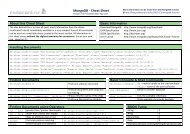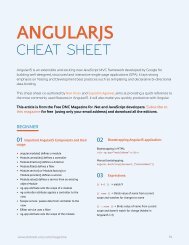build_your_own_angularjs_sample
build_your_own_angularjs_sample
build_your_own_angularjs_sample
You also want an ePaper? Increase the reach of your titles
YUMPU automatically turns print PDFs into web optimized ePapers that Google loves.
Build Your Own Angular Chapter 1. Scopes And Digest<br />
Short-Circuiting The Digest When The Last Watch<br />
Is Clean<br />
In the current implementation, we keep iterating over the watch collection until we have<br />
witnessed one full round where every watch was clean (or where the TTL was reached).<br />
Since there can be a large amount of watches in a digest loop, it is important to execute<br />
them as few times as possible. That is why we’re going to apply one specific optimization<br />
to the digest loop.<br />
Consider a situation with 100 watches on a scope. When we digest the scope, only the first<br />
of those 100 watches happens to be dirty. That single watch “dirties up” the whole digest<br />
round, and we have to do another round. On the second round, none of the watches are<br />
dirty and the digest ends. But we had to do 200 watch executions before we were done!<br />
What we can do to cut the number of executions in half is to keep track of the last watch<br />
we have seen that was dirty. Then, whenever we encounter a clean watch, we check whether<br />
it’s also the last watch we have seen that was dirty. If so, it means a full round has passed<br />
where no watch has been dirty. In that case there is no need to proceed to the end of the<br />
current round. We can exit immediately instead. Here’s a test case for just that:<br />
test/scope_spec.js<br />
it("ends the digest when the last watch is clean", function() {<br />
});<br />
scope.array = _.range(100);<br />
var watchExecutions = 0;<br />
_.times(100, function(i) {<br />
scope.$watch(<br />
function(scope) {<br />
watchExecutions++;<br />
return scope.array[i];<br />
},<br />
function(newValue, oldValue, scope) {<br />
}<br />
);<br />
});<br />
scope.$digest();<br />
expect(watchExecutions).toBe(200);<br />
scope.array[0] = 420;<br />
scope.$digest();<br />
expect(watchExecutions).toBe(301);<br />
We first put an array of 100 items on the scope. We then attach a 100 watches, each<br />
watching a single item in the array. We also add a local variable that’s incremented<br />
whenever a watch is run, so that we can keep track of the total number of watch executions.<br />
18 ©2014 Tero Parviainen Errata / Submit




